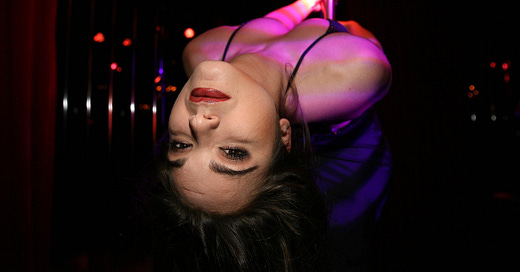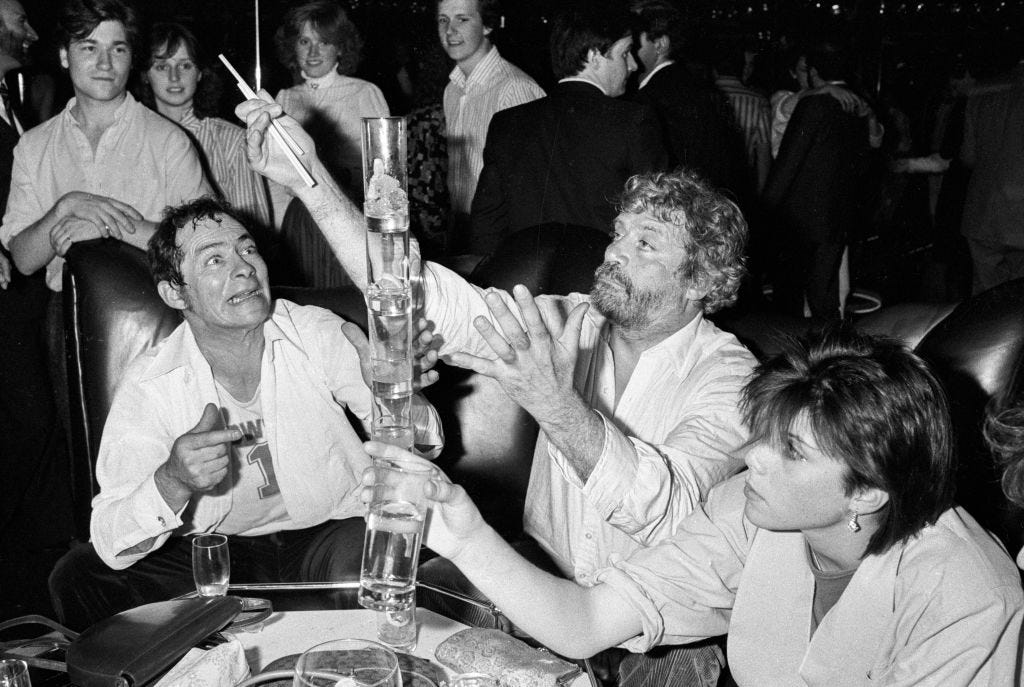This is a special contributor issue of London in Bits. All contributors to LiB are paid £200 for original commissions. This is all made possible through supporters, as all the money from our subscriptions goes towards paying our writers.
If you’ve been enjoying London in Bits, and you want to help support smart, independent writing about London, then please consider subscribing. It costs £5/month or £50/year and you can get a free trial if you would like to see what you get:
And if you have something that you’d like to write about and you think LiB would be a good fit, then send us a quick pitch email on londoninbits@gmail.com
I have this theory that everyone gets a ‘movie moment’. A cinematic, somewhat clichéd incident that sticks in your memory and marks a pivotal point in your life. Maybe yours is the meet-cute of reaching for the same can of beans in Tesco with the man that became your husband.
In mine, I was a chaotic, crying teenager confessing to an older, very glamorous girl I’d recently met that I couldn’t pay my rent. She squeezed my hand and replied: “Look, I wouldn’t tell you about this unless it really seemed like you needed it…” Then she offered me a job in a famous strip club.
It is worth providing some context. I had been living abroad for a long time and had returned to London to study at 17. I’d been considered a difficult child and given that you’re allowed to legally live alone in the UK, my parents didn’t feel too guilty about cutting ties with me round about then. My rent had already accrued to a sum that I barely understood, and I was living off food I shoplifted in supermarkets. As wayward – to use a Victorian term – as you may be, you’re unlikely to be savvy at that age. And I wasn’t, or I wouldn’t have agreed to go with someone I barely knew to a job interview to be a waitress at Stringfellow’s.
Off I trotted a few nights later, wearing a black dress and heels, feeling self-conscious. It was 9.00pm and the downstairs area was cordoned off. We slipped over the rope and settled by the bar. My ‘friend’ said hello to a few people milling around, then a man in a dapper three-piece suit sped past, ‘Nick!’ she grabbed him, ‘meet Mona1!’. Nick looked me up and down, said, ‘Great, get changed,’ and rushed off. This was how I entered the workforce of Stringfellow’s at Covent Garden.
Peter Stringfellow, the owner and namesake, was one of Britain’s more dubious public characters. Born in Sheffield (and ‘dragged up’, as his brother once told me), he made a fortune opening clubs and getting bands as big as The Who and Pink Floyd to perform. He opened Stringfellow’s in 1980, but it wasn’t till 1996 that he introduced what is coyly described on the club’s website as ‘tableside dancing’.
From what I understand, Stringfellow’s boomed for the next 15 years or so, with celebrities from Gary Lineker all the way up to Kiefer Sutherland and Rihanna (I was there that night - it was wild) visiting. The press called him things like ‘playboy businessman’ and ‘Legendary Lothario’. It was considered the ‘classy’ place to go and ogle women, a ‘Gentleman’s’ club par excellence, filled with important people having naughty fun.
But I arrived at Stringfellow’s in the 2010s, when the social climate had started changing. Most men no longer thought strip clubs were funny, and businessmen or bankers – whose teams now included a woman or two – no longer thought it was an appropriate place to entertain their clients. Strings still had big name clientele; but they didn’t want to be seen there anymore.
Red velvet and overwhelming dread
The club looks exactly as you’d imagine. Red velvet armchairs, crystal chandeliers, heavy red curtains over the booths, gold, mirrors, more gold, more mirrors, and a red canopy ceiling. There was a stage in the middle with three poles. At the beginning, slipping past the heavy gold cord to get changed for work, I’d be high on adrenaline. That was before the overwhelming dread that started coming over me in waves, like nausea.
Peter Stringfellow himself was a frequent presence, not that he would deign to talk to me. I’ll forever remember him swaggering around the place like a slimy pirate with his long silver locks and his permanent Cheshire cat grin. I never saw him without this black jacket that had a huge rhinestone skull on the back.
He had a roster of managers that reads like a roll-call of bad stereotypes: his own son, who I remember being insecure as he seemed to live in his father’s shadow; his daughter, who was as no-nonsense as an older woman in that environment had to be; an aged upper-class chap who spoke beautifully but was the most awful pervert and did favours for girls who did favours for him; and the bad-tempered snob who hated women and lived to put them down.
The only one I could stomach was his brother, Paul, who walked around holding a keyring the size of a saucer with hundreds of jangling keys, like he was the Chatelaine of a castle. He was a gentle grandfatherly man, to whom I’m still grateful for his little kindnesses.
Most managers had favourites and they showed it. Stringfellow’s was one of those places where you learn just how unfair life is. It was deeply divided into factions, where ever-changing groups railed against each other and cutthroat practices were used to demean people you might see teaming up next week. The goal of the 80 or so dancers (known collectively as ‘the girls’) that would be there on any given night, of the bartenders, and the waitresses was to try and get the guests to part with as much cash as possible without making complaints.
To get one private lap dance cost £20, but the girls were encouraged to make you ‘buy time’. Half an hour with a dancer was £200, and an hour was £400. With that you could get multiple dances in the privacy of a booth, but mostly, client and dancer would talk. Patrons often brought their problems to the club. The dancer would always want to chat more than dance, and so the House Mother would come over and prod her into action.
The House Mothers were fully dressed (the only women allowed to be) and it was their job to oversee the dancers. They were a breed; strict, maternal, occasionally punishing. If a girl looked like she was going to cross the line with a client, the House Mother stepped in. Equally, if a client looked like he was going to cross a line, she’d be there. They organised the relentless stream of girls on the stage (everyone had to dance an obligatory number of times a night), checked their outfits complied with rules, and shook dancers down if they were hoarding money.
The girls weren’t allowed to keep any cash on them during the club’s open hours. Clients either paid on card, or they had to ‘buy’ Heavenly Money, which was sold from a booth in the corner. Yes, that’s right, Stringfellow’s has their own currency so nobody can steal. The house always wins.
Bar fights
My job as a waitress really just involved uncorking champagne. Nonetheless, the waitresses existed in their own little hierarchy. We had a floor manager, who was supposed to make sure we took turns serving. However, the waitress at the top of the food chain made sure she got the best (read: highest spending) tables, either through bribery or blackmail. If a ‘good’ table came in and it wasn’t her turn, she would cause enough trouble to get the floor manager to hand the table over.
My arrival was an unwelcome one (the more waitresses, the more customers we’d have to split) and I was largely ignored until I got a ‘good’ table by accident. I knew something was wrong when everybody stopped talking to me, and started handing me the wrong drinks, getting me in trouble with both the managers and the clients. But this was nothing compared to what happened to Diana, the waitress who arrived after me.
Everyone felt sorry for me because I was so inexperienced, but nobody felt sorry for Diana. She ended up getting framed for overcharging a client and the last time I saw her she was sobbing, naked and drunk in the shower at 5am while the other waitresses stonily got changed to go home around her. When I tried to speak to her, they shooed me away. There was no mercy.
I saw waitresses wrangle tips out of clients by flirting, begging, and intimidating. Part of the reason I wasn’t considered competition was because when a client said, ‘no tip,’ I accepted the answer. That doesn’t mean I didn’t make good money. I made enough to last me for several years afterwards… So imagine how much they were raking in.
Our money came from three different avenues. Firstly, our wage, which I believe was illegally low, somewhere in the region of £4 an hour. Peter would respond to complaints about this by threatening to report us to HMRC for not declaring our cash tips. And because it was true that we didn’t declare them, we’d all shut up.
The second income stream was tips. Tips could be enormous: I’m talking a few thousand in cash a night, if you were good at extraction. There was a lot of tension between waitresses and dancers because of this. Waitresses thought they were better because they kept their clothes on, but they were bitter about dancers who netted still bigger amounts. Dancers felt the waitresses were lying to themselves – we worked in lingerie – and resented that we ate into their potential earnings.
Lastly, there was the 25% service charge, half of which went right into your pocket. The point of this was to make you upsell. We were encouraged to tout expensive champagne (the cheapest bottle was £80-something pounds and we always used to eyeroll when someone ordered it. ‘God, he didn’t look like he was that stingy’). When you couldn’t upsell, you tacitly found other ways to scam the punters. We pretended champagne had run out before it had, encouraging them to reorder. If the client seemed drunk, we’d add food and drinks on his tab for ourselves to eat in the back, and to run up his bill.
Addicted to the money
I was taught a lot of tricks: If you want to know how rich someone is, look at their watch (and you better know all the expensive watch brands). Americans can be relied on to be more respectful, plus tipping is in their culture. But watch out for Scandinavians who are sick of prominent female rights in their countries, and are likely to take it out on you.
There were fun clients sometimes, who made everything better. Who were polite, interesting, and respectful. But there were also clients like the drunk football team who poured vodka on the table, dipped twenty-notes into the liquid, then made me peel them off for my tip.
Most of all, the job was standing around for hours in an empty club waiting for a customer, watching girls rotate in sequined bras. Every shift would start with us putting on our uniform in the changing room, where it stank of feet and the discarded fishnets that we’d throw into the corner till they built into a filthy heap. Every shift would finish with me on the bus back home, clutching a fat envelope of money inside the pocket of my coat, feeling completely numb.
It got to a point where I would hide in the bathrooms until a manager banged the door of my cubicle unceremoniously and roared, ‘MONA GET ON THE FLOOR’. I would burst into tears over nothing in particular, and plead with everyone to let me leave early if it was a quiet night. And yet, like everybody else, I was addicted to the money. I knew dancers that had been there over a decade, made hundreds of thousands, but instead of saving they went on lavish holidays and bought designer handbags, so they kept having to come back. It took me years to leave.
There’s this idea nowadays that these environments foster unity amongst women. But I’ve never seen women so competitive and so vicious. Stealing, slapping, screaming? All normal. Girls saying horrible things about each other to put a client off hiring a rival? I heard them telling men that other girls didn’t wash, or that they escorted on the side and so many more skin-crawling, frequently racist, offensive things.
The club didn’t ruin my trust in men, it ruined my trust in women.
Films like Hustlers, starring every sexy star from Jennifer Lopez to Cardi B, present the strip club as a breeding ground of sisterhood and source of female empowerment. Which only tells me that nobody involved with this movie can have had anything to do with the real places. Worse, they make it look compelling. A place where you can be in control of your destiny and make friends. Meanwhile outlets from the Metro to Channel 4 News are reporting that last year there was a recorded 30% jump in callers looking to enter sex work due to the cost-of-living crisis.
For anyone for whom this is even the slightest possibility, I urge you to reconsider. Protect your daughters, support your friends. Stringfellow’s is not the be all and end all, but in my time I met literally hundreds of women – some of whom I still know to this day – and I can tell you unequivocally that once you go in, it’s almost impossible to go back.
You get hooked on the money. You often get hooked on drugs. Normal working hours become impossible. Worst of all, your perception of the world subtly shifts until you’re no longer who you want to be. You see people as marks, there for the rinsing. Life becomes about transactions because everything is ‘What can I get out of this?’. There are other ways to make money, but it will be very hard to recover your lost self.
Take it from me. God knows, my ‘movie moment’ didn’t lead to me becoming a good person, and I still haven’t come close to a redemption arc.
5 little bits
Simon Hattenstone interviewed the mayor for the Guardian this weekend, and in that interview, Khan said that “he has been left with mental trauma due to a combination of the regular death threats he receives as London mayor, as well as dealing with the aftermath of disasters and terror attacks.”
Last week, work started to repair the damage done to the Eric Gill statue outside the BBC building last year by a protestor wielding a hammer. On Saturday “a man wearing a Spiderman mask” scaled the handy scaffolding and “attacked the statue with a hammer and chisel”.
Almost exactly two years ago we wrote about the rows over whether Primrose Hill should be closed after dark or not, and this week Royal Parks announced that they are going to start closing the park from 22:00 until 06:00 on Fridays, Saturdays and Sundays. Click the article to see of a picture of local resident, Jon Snow who is not happy about the decision and also has a very cute dog.
The BBC Travel site has a pretty in-depth article on the work that’s going on to restore London’s 640km of waterways back to their “former glory”.
Nicole Scherzinger is going to play Norma Desmond in the new production of Sunset Boulevard that’s due to open in the West End in September.
The names of some of the people in this story have been changed to protect their identities.









